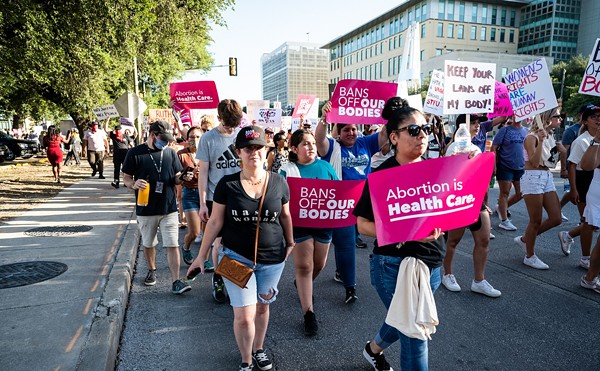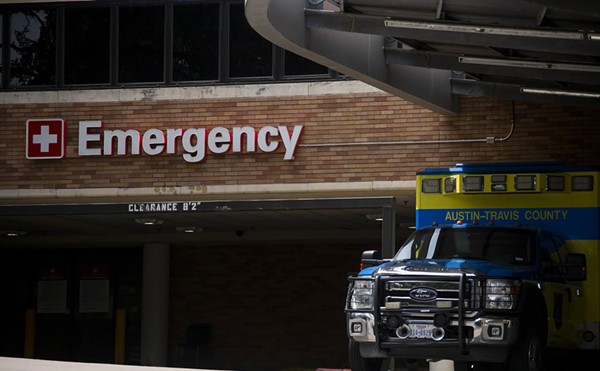San Antonio Planned Parenthood staffers felt like they were under full-on assault at the end of last week as both state and federal lawmakers targeted the group, trying to restrict any funding to the organization’s clinics.
The same day the state Senate passed a controversial pre-abortion sonogram law, something Planned Parenthood has loudly opposed, Texas Attorney General Greg Abbott handed down two opinions likely to strip away all funding to the group’s Texas clinics that provide family planning care, not abortions, to low-income women in the state.
Abbott’s first opinion says that the state’s Health and Human Services Commission can bar funding to any groups that either perform abortions, or promote elective abortions or “affiliates” of such clinics. Abbott’s second ruling gives the commission the authority to determine what counts as an “affiliate” of an abortion provider.
With Republicans leading in Austin, it’s likely the commission will come up with a definition that rules out funding to Planned Parenthood’s family planning centers, clinics that have provided STD testing, birth control, and cervical cancer screenings to thousands of Medicaid patients through the state’s Women’s Health Program since 2007.
State Senator Bob Deuell, a Greenville physician who has long opposed any funding for Planned Parenthood, wasn’t quiet about his intent when he requested a ruling from Abbott last summer. Deuell argued that the 2005 law creating the Women’s Health Program, an initiative to expand family planning services to low-income women, should have excluded all Planned Parenthood clinics, even those that don’t perform abortions.
HHSC for years has chosen to overlook the issue, worrying that banning all Planned Parenthood clinics may be unconstitutional. But Abbott, in his opinion, said there’s no constitutional problem, paving the way for the HHSC to restrict WHP funding to Planned Parenthood clinics.
Stephanie Goodman, an HHSC spokeswoman, said last week that the commission can now move forward to block funding to any “affiliates” of abortion providers.
Sen. Carlos Uresti, D-San Antonio, who voted in favor of the controversial sonogram bill, objects to the effort to wipe out Planned Parenthood. He wrote the Current in an email, “While this ruling may follow the letter of the law, it will put at risk thousands of women who receive cancer screenings, birth control, and other health services at Planned Parenthood clinics across Texas that don’t even provide abortions. … We shouldn’t let partisan politics or philosophies affect the services that Planned Parenthood is providing to the women of Texas.”
According to HHSC, Planned Parenthood clinics around the state have received $17.6 million for services received by WHP patients since 2007. The year the WHP was created, some Texas Republicans tried to block the organization from receiving Medicaid funding, sparking a legal battle in the federal courts that shook up Planned Parenthood’s organizational structure in Texas.
However, the 5th U.S. Circuit Court of Appeals ruled that the organization could keep its funding if it established separate entities for family planning care and abortion providers, which it did. In South Texas, the organization now has two types of facilities: Family Planning Associates clinics and another branch of clinics that perform abortions, each with its own board of directors and funding stream.
Planned Parenthood contends that its clinics have largely helped make the WHP the success that it is. In its report last month, the Legislative Budget Board recommended expanding the program to include more women, saying it helps the state save on pregnancy-related Medicaid costs. According to the LBB, expanding eligibility would save the state almost $4 billion by cutting down on unwanted pregnancies.
Citing those findings, Planned Parenthood says cutting its clinics would drastically restrict access for women seeking to enroll in the program. In some communities, especially in rural parts of South Texas, Planned Parenthood has the only clinics within miles that offer such services to low-income women, said Yvonne Gutierrez, a spokeswoman for The Planned Parenthood Trust of San Antonio & South Central Texas.
About 40 percent of all WHP claims were from Planned Parenthood clinics in 2009, Gutierrez said. In 2010, the group’s four clinics in San Antonio, along with those in Alice, Kingsville, Harlingen, Raymondville, and Brownsville provided care for 5,266 women. “It’s really to the detriment of women that these senators are coming after providers,” Gutierrez said.
Abbott’s rulings could also affect other WHP providers, such as hospitals and some private-practice doctors that may, in extenuating circumstances, recommend an abortion, Gutierrez said. “Many local hospitals participate in the Women’s Health Program, and they also provide abortions in some rare circumstances.”
Whether or not the HHSC considers Planned Parenthood’s family planning clinics “affiliates” of abortion providers, however, could become a moot point for the organization: the U.S. House on Friday passed a proposal to block all federal funding to Planned Parenthood, though Parenthood reps say they do not expect the proposal to pass either the Senate or the President’s desk. •

















